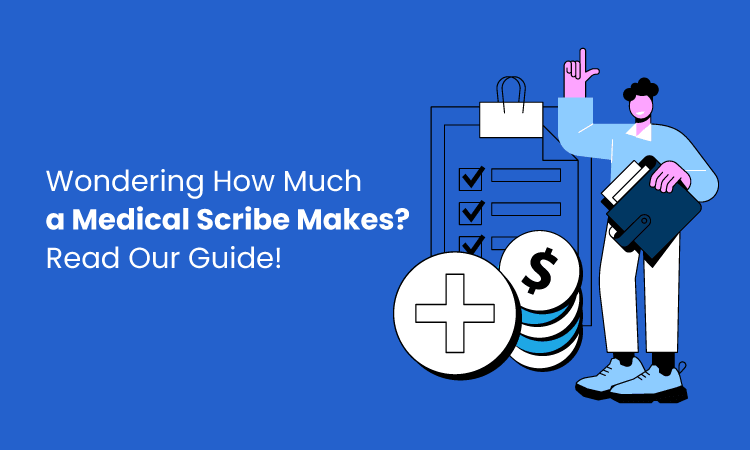When hiring a medical scribe, one of the first questions a healthcare manager or facility owner would ask is, “how much does a medical scribe make?”
Scribes are professionals who help physicians by documenting medical encounters in real-time, using electronic medical records. They capture patient history, examination findings, test results, and treatment plans, allowing physicians to focus on patients and decision-making.
They may also assist with lab tests and imaging studies, ensuring all relevant information is recorded. The work of a scribe improves documentation efficiency and accuracy, and can help reduce physician burnout.
How Much Does a Medical Scribe Make? 5 Crucial Factors
The compensation and earning potential for medical scribes can vary depending on factors such as location, experience, and employer. According to data from Payscale.com, the average hourly wage for an in-person, US-based medical scribe is around $13.88, with an average annual salary of around $36,688.
Scribes who work in certain geographic areas or in specialized fields may have a different rate. Additionally, those who have more experience or advanced certifications may also have the potential to earn higher wages. Here are 5 factors that greatly affect how much a medical scribe gets paid.

Location
Location can play a significant role in determining the salary of a medical scribe. Some states and cities tend to pay higher salaries than others. For example, medical scribes in California, New York, and Texas tend to earn higher salaries than those in other states.
Within California, scribes working in San Francisco, Los Angeles, and San Diego tend to earn higher salaries than those working in other parts of the state. Similarly, in New York, scribes working in New York City tend to earn higher salaries than those who work out of other cities inside the state.
Another factor that can impact the salary of a medical scribe is the cost of living in a particular area. Scribes working in cities with a high cost of living may earn higher salaries to help offset their expenses. For example, in Oregon, medical scribes earn between $9 and $15 per hour. In Portland, OR a medical scribe might have an average annual salary of $32,338. Meanwhile, in Eugene, OR the average is $30,088.
Additionally, certain regions have a higher demand for medical scribes, which can also affect the salary. For instance, medical scribes earn $10 to $17 per hour in Jacksonville, FL, a city with a population of more than 950,000. Meanwhile, in Pensacola, FL, which has about 53,000 residents, medical scribes earn an average of $9 to $11 per hour.
Experience and Education
Generally, more experienced and educated medical scribes earn higher salaries than those with less experience or education. Experience plays a significant role in determining a medical scribe's salary. As a medical scribe gains more experience working in a healthcare setting, they may be able to command a higher salary due to their increased knowledge and expertise in the field.
This can include knowledge of medical terminology, procedures, and electronic medical record systems, as well as experience working with patients and healthcare professionals.
Educational attainment is another factor that can affect a medical scribe's salary. Medical scribes with higher levels of education, such as a bachelor's or master's degree in a related field, may be able to earn higher salaries than those with only a high school diploma or associate's degree.
It is because individuals with higher levels of education typically have a greater understanding of the medical field, and may be able to perform more complex tasks and assume more responsibilities.
In addition, some states may have certain requirements for the education and certification of medical scribes, which may lead to higher salaries for those who meet these criteria.
Specialization
Medical scribes who have specialized training and experience in certain areas may be able to earn higher salaries than those without these specialized skills. Some examples of specializations that can lead to higher salaries include:

- Emergency Medicine: Scribes with specialized training and experience in emergency medicine may be able to earn higher salaries, as they are able to work in high-pressure, fast-paced environments and have knowledge of emergency procedures and protocols.
- Cardiology: Individuals with knowledge of heart conditions, cardiac procedures, and EKG interpretation could command higher salaries.
- Oncology: Scribes with knowledge of cancer treatments, radiation therapy, and chemotherapy protocols might get a competitive salary.
- Orthopedics: Medical scribes who know their way around orthopedic procedures may be paid more than scribes with general medical knowledge, as they have knowledge of bone and joint conditions and surgeries.
- Neurology: Medical scribes with experience in neurology might be paid more, as they know a lot about procedures involving the brain and nervous system.
Medical scribes with certifications may also get paid more, since these documents demonstrate that they have met certain standards or qualifications. Organizations such as the American Medical Scribe Association (AMSA) or the National Healthcareer Association (NHA) are examples of accreditation bodies in the United States.
It is important to note that the demand and availability of specialized medical scribe positions vary by location and facility. The more specialized the area of focus, the more in demand the scribe will be and will be able to earn higher salaries.
Type of employer
Hospitals and private practices tend to have higher patient volumes than other settings, such as clinics or nursing homes, leading to a higher workload for medical scribes. Scribes working in these settings may be able to command higher salaries due to the increased demand for their services and the level of responsibility they have to handle.
Furthermore, hospitals and private practices tend to have more complex cases and procedures which require a higher level of knowledge and expertise from the medical scribe, leading to higher salaries for scribes who can handle the complexity.
How Much Does a Medical Scribe Make? Average Salaries
A US-based medical scribe's hourly pay typically falls between $12.00 and $15.00, and their annual salary can range from $24,000 to $37,000, with a median of $30,500. Pay also varies by location. According to ZipRecruiter, here are the 10 states where medical scribes earn the highest salaries:

States with Highest Salaries for Medical Scribes
- New York – $36,241 ($17.42 hourly)
- Idaho – $35,160 ($16.90)
- California – $34,718 ($16.69)
- New Hampshire – $33,930 ($16.31)
- Vermont – $33,005 ($15.87)
- Maine – $32,763 ($15.75)
- Massachusetts – $32,219 ($15.49)
- Hawaii – $31,989 ($15.38)
- Tennessee – $31,741 ($15.26)
- Nevada – $31,722 ($15.25)
The states of New York, Idaho and California are known for offering higher than average salaries for Medical Scribe positions. In particular, the average salary in California is 6.3% above the national average and the average salary in New York is an additional 10.9% higher than the national average, specifically $3,573 more than the average salary of $32,668.
Salary ranges based on experience
Here is an approximate breakdown of salaries based on experience:
- Entry-level (1-3 years of experience): $12 – $15 per hour
- Intermediate (3-5 years of experience): $15 – $18 per hour
- Experienced (5-10 years of experience): $18 – $22 per hour
- Expert (10+ years of experience): $22 – $25 per hour
It's important to note that these figures are approximate and can vary based on location, employer, and other factors. Additionally, some employers may offer benefits such as health insurance and retirement plans, which can add value to the overall compensation package.
How Much Does a Medical Scribe Make? It Depends
The compensation and earning potential for medical scribes can vary depending on a number of factors. These factors can include location, where medical scribes are employed. For example, scribes working in urban areas may earn more than those working in rural areas.
Additionally, experience can also play a role in determining compensation and earning potential. A medical scribe with more experience may be able to command higher pay than a less experienced scribe. Lastly, the employer can also be a factor in determining compensation and earning potential. A medical scribe working for a large healthcare organization may earn more than one working for a smaller practice.
Offset the costs of hiring healthcare support personnel by partnering with Wing Assistant! We connect business owners and busy managers with trained, dedicated medical scribes and assistants. Get in touch today to learn more!
Aya is Wing Assistant’s blog manager. When she’s not wrangling content briefs, editing article drafts and handling on-page SEO, she is crafting messages for Wing’s other communication materials. Aya writes about SaaS startups, marketing for startups, search engine optimization, and pop culture.







